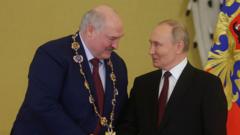Biden's escalation paralysis has devastated Ukraine

Bob Woodward’s new book “War” provides a harrowing glimpse into the Biden administration’s national security decisionmaking process. Established early in the war, the White House created its own self-fulfilling prophecy.
President Biden’s self-imposed red line was his evergreen fear of Russian use of tactical nuclear weapons in Ukraine.
Then-Chairman of the Joint Chiefs of Staff Gen. Mark Milley inexplicably told the Kremlin all it needed to know when he asked his counterpart in Russia, Gen. Valery Gerasimov, “under what conditions would you use nuclear weapons?”
Milley was basically asking the Russians, "How far are we allowed to go? What are our limits?" He thus allowed Russian President Vladimir Putin to establish our rules.
Gerasimov’s response was this: “If there’s an attack on Russia that threatens the stability of the regime — condition one. Second, is if a foreign power attacks Russia with a weapon of mass destruction — so that’s chemical, biological or nuclear. Third, Russia reserves the right to use tactical nuclear weapons in the event of catastrophic battlefield loss.”
That one phone call gave the Kremlin the roadmap for constraining U.S. support to Ukraine — and the Kremlin has been exploiting it ever since. Biden’s escalation paralysis likely began with this call.
Gerasimov’s third condition to Milley explains the Biden administration’s "just enough" strategy for aid to Ukraine and his "just weaken Russia" approach to the war. As we have argued, the administration’s “fear of winning outweighed the fear of losing. Enabling Ukraine to defend itself became the strategy — a war of attrition that eventually would bring both to the negotiation table was seen as the best course of action. Not for Ukraine — but for the U.S.”
Putin has leveraged that weakness ever since. And the U.S. has obliged. Every battlefield success by Ukraine, every new weapons system provided to the Ukrainian military, was countered with a new Russian nuclear threat.
Tactical and strategic nuclear forces exercises, test launches, aides displaying the Russian "nuclear football" and meetings with North Korea — all designed to reinforce the belief that Russia would respond with a nuclear option.
Enabling Ukraine to win has never been an option.
“If we do not fully succeed in ejecting Russia from Ukraine, we will have let Putin kind of get away with something,” Biden said. “If we do fully succeed in ejecting Russia from Ukraine, we face a very strong likelihood of nuclear use because Putin is not going to let himself be routed out of Ukraine without breaking the seal on tactical nuclear weapons. So, we’re stuck. Too much success is nukes, too little success is a kind of uncertain indefinite outcome.”
Biden would later say that “if Putin used a tactical nuclear weapon on the battlefield in Ukraine, the U.S. would not respond with nuclear weapons,” adding that he was not “going to have a nuclear response to battlefield use in Ukraine.” As Bob Woodward concluded, “nuclear weapons were the silent shadow present in all their deliberations.”
The Biden administration chose the easy wrong (arm Ukraine to defend itself) over the difficult but correct decision of arming Ukraine to defeat the Russians and push them out of the country.
According to retired Army Gen. Jack Keane, Putin "is completely determined to take control of Ukraine ... he is also determined to expand into eastern Europe and increase the Russian Empire.” The Kremlin is even integrating 11,000-plus North Korean troops into Russian formations in their Kursk counter offensive.
However, Ukrainian President Volodymyr Zelensky is determined to secure Ukraine’s independence, telling NBC’s "Meet the Press" anchor Kristen Welker, “We aren't ready to give our freedom to this f---ing terrorist Putin."
Russian casualties are not a showstopper for Putin — he will continue to press, to create carnage. Putin’s "special military operation" is now nearing 33 months. He has incurred 712,610 Russian casualties. During October, Moscow lost an average of 1,500 troops a day. According to the Ukrainian general staff, Russia lost 1,950 soldiers on November 11.
While the Biden administration attempts to "right the ship" in Ukraine during its final months in office, the incoming Trump team is considering cutting aid to Ukraine and getting firmly behind Israel in its conflict with Hamas. But the two are inextricably connected by an "Axis of Evil" led by Russia.
Keane made this connection on Fox News, “China, Russia, Iran and North Korea are colluding and cooperating and coordinating together and they’ve become so much more aggressive and assertive ... It’s not isolated that Russia invaded Ukraine. It’s not isolated that Iran operationalized all of its proxies in the Middle East.”
Sen. Bill Hagerty’s (R-Tenn.) comment on "Face the Nation" about cutting aid to Ukraine to “stop the carnage” is not the solution. It will not stop the carnage — rather, it will simply expedite it.
Russia will fire more artillery, launch more cruise missiles and drones, and throw more bodies into the Ukraine meat grinder until Kyiv capitulates. Ukrainian cities and the civilians who reside there will bear the brunt of the slaughter. So too will the soldiers in the trenches, once they have exhausted their ammunition.
Biden’s last-minute efforts to disburse the remaining $6 billion remaining from the aid package approved by Congress in April, along with $20 billion in loans to Ukraine, will have no effect on the outcome of the war if they do not also provide precision deep strike weapons and the authorization to use them. Doubling down on defensive weapons will not win the war but only prolong it. Why is that lesson so difficult to understand?
Europe is beginning to get it, however.
If elected German chancellor, Friedrich Merz says “he would push for a 24-hour deadline for Russia to end the war. Should this demand go unmet, he would advocate delivering Taurus long-range missiles to Ukraine.”
Even the United Kingdom and France are developing much-needed backbone as the second Trump administration looms. According to The Telegraph, "Keir Starmer and Emmanuel Macron ... will discuss on Monday whether Joe Biden ... can be persuaded to give Ukraine permission to fire Storm Shadow missiles deep into Russia."
Washington’s best course of action is a Ukraine-first policy — defeat Russia. Ukraine is on the edge of a negative outcome if it is not provided with critical weapon systems to defeat Russian and North Korean troops and their weapon systems in Russia. Israel, on the other hand, can hold its own for now against Hamas, Hezbollah and Iran. Once Russia is defeated in Ukraine, its support to North Korea and Iran will wane.
Trump needs to see a winning hand to get behind. Biden has not enabled Ukraine to win — merely to survive. That said, the Trump administration would likewise do well by remembering Captain James Lawrence’s call concerning the fate of the USS Chesapeake in June 1813: "Don't give up the ship!”
Ukraine is that ship — a vessel of democracy in the Black Sea region, fighting for its survival. A Russian win would encourage others within the "Axis of Evil" to pursue territorial aspirations. Preventing that is very much in the national security interest of the U.S.
Col. (Ret.) Jonathan Sweet served 30 years as an Army intelligence officer. Mark Toth writes on national security and foreign policy.
Topics
-

Russia-Ukraine war live: Kremlin accuses US of raising tensions with missile decision; Erdoğan to present peace plan at G20
World - The Guardian - 2 days ago -

European stocks fall as Ukraine war escalation unsettles markets
Business - Financial Times - Yesterday -

Biden lifts ban on Ukraine using US weapons to strike deeper into Russia
World - The Guardian - 3 days ago -

Biden has authorized Ukraine to use long-range missiles inside Russia: Reports
Politics - The Hill - 3 days ago -
North Korea troops in Ukraine would escalate conflict, Lukashenko tells BBC
World - Yahoo News - October 23 -

North Korea troops in Ukraine would escalate conflict, Putin's closest ally tells BBC
Top stories - BBC News - October 23 -

Trump speaks with Putin and advises him not to escalate Ukraine war – report
World - The Guardian - November 11 -

North Korean troops in Ukraine ‘grave escalation’, Scholz tells Putin
Top stories - BBC News - 5 days ago
More from The Hill
-

Police report details Hegseth sexual assault allegations
Politics - The Hill - 26 minutes ago -

FCC chair to step down on Trump's inauguration
Politics - The Hill - 27 minutes ago -

Watch live: Buttigieg speaks on expected Thanksgiving week travel
Politics - The Hill - 32 minutes ago -

Trump could usher in a golden age of government transparency and disclosure
Politics - The Hill - 32 minutes ago -

Democratic chairman blasts Mayorkas, Wray for failure to testify; Threats hearing postponed
Politics - The Hill - 33 minutes ago
